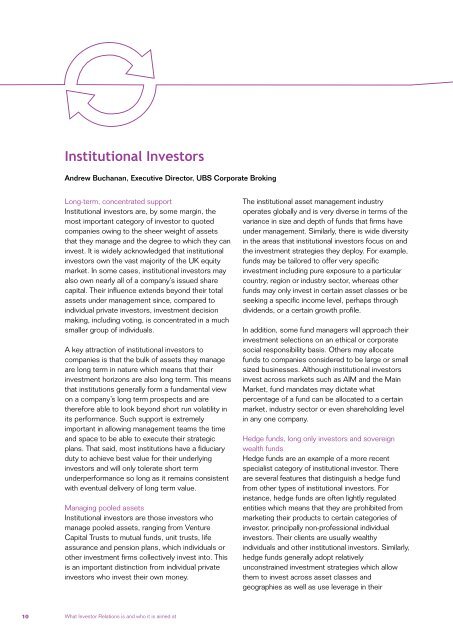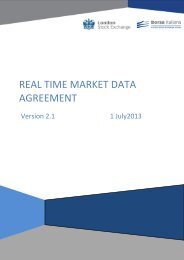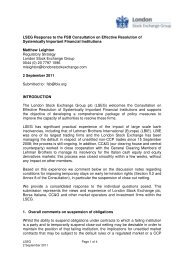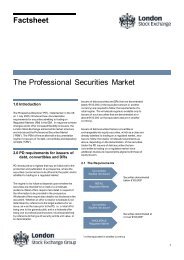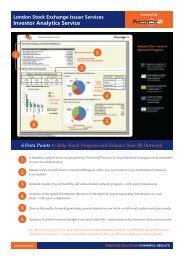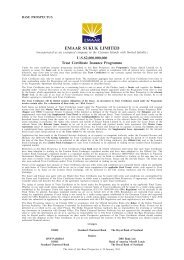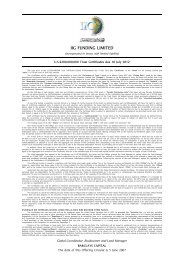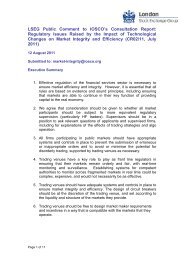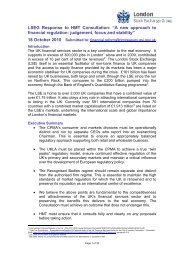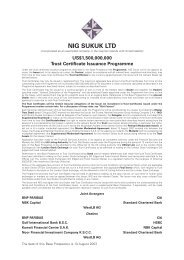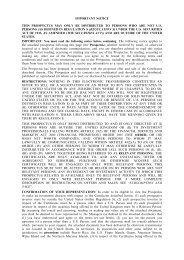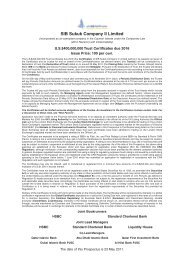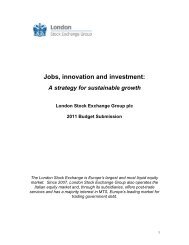Investor Relations - A Practical Guide - Investis
Investor Relations - A Practical Guide - Investis
Investor Relations - A Practical Guide - Investis
Create successful ePaper yourself
Turn your PDF publications into a flip-book with our unique Google optimized e-Paper software.
Institutional <strong>Investor</strong>s<br />
Andrew Buchanan, Executive Director, UBS Corporate Broking<br />
Long-term, concentrated support<br />
Institutional investors are, by some margin, the<br />
most important category of investor to quoted<br />
companies owing to the sheer weight of assets<br />
that they manage and the degree to which they can<br />
invest. It is widely acknowledged that institutional<br />
investors own the vast majority of the UK equity<br />
market. In some cases, institutional investors may<br />
also own nearly all of a company’s issued share<br />
capital. Their influence extends beyond their total<br />
assets under management since, compared to<br />
individual private investors, investment decision<br />
making, including voting, is concentrated in a much<br />
smaller group of individuals.<br />
A key attraction of institutional investors to<br />
companies is that the bulk of assets they manage<br />
are long term in nature which means that their<br />
investment horizons are also long term. This means<br />
that institutions generally form a fundamental view<br />
on a company’s long term prospects and are<br />
therefore able to look beyond short run volatility in<br />
its performance. Such support is extremely<br />
important in allowing management teams the time<br />
and space to be able to execute their strategic<br />
plans. That said, most institutions have a fiduciary<br />
duty to achieve best value for their underlying<br />
investors and will only tolerate short term<br />
underperformance so long as it remains consistent<br />
with eventual delivery of long term value.<br />
Managing pooled assets<br />
Institutional investors are those investors who<br />
manage pooled assets, ranging from Venture<br />
Capital Trusts to mutual funds, unit trusts, life<br />
assurance and pension plans, which individuals or<br />
other investment firms collectively invest into. This<br />
is an important distinction from individual private<br />
investors who invest their own money.<br />
The institutional asset management industry<br />
operates globally and is very diverse in terms of the<br />
variance in size and depth of funds that firms have<br />
under management. Similarly, there is wide diversity<br />
in the areas that institutional investors focus on and<br />
the investment strategies they deploy. For example,<br />
funds may be tailored to offer very specific<br />
investment including pure exposure to a particular<br />
country, region or industry sector, whereas other<br />
funds may only invest in certain asset classes or be<br />
seeking a specific income level, perhaps through<br />
dividends, or a certain growth profile.<br />
In addition, some fund managers will approach their<br />
investment selections on an ethical or corporate<br />
social responsibility basis. Others may allocate<br />
funds to companies considered to be large or small<br />
sized businesses. Although institutional investors<br />
invest across markets such as AIM and the Main<br />
Market, fund mandates may dictate what<br />
percentage of a fund can be allocated to a certain<br />
market, industry sector or even shareholding level<br />
in any one company.<br />
Hedge funds, long only investors and sovereign<br />
wealth funds<br />
Hedge funds are an example of a more recent<br />
specialist category of institutional investor. There<br />
are several features that distinguish a hedge fund<br />
from other types of institutional investors. For<br />
instance, hedge funds are often lightly regulated<br />
entities which means that they are prohibited from<br />
marketing their products to certain categories of<br />
investor, principally non-professional individual<br />
investors. Their clients are usually wealthy<br />
individuals and other institutional investors. Similarly,<br />
hedge funds generally adopt relatively<br />
unconstrained investment strategies which allow<br />
them to invest across asset classes and<br />
geographies as well as use leverage in their<br />
10<br />
What <strong>Investor</strong> <strong>Relations</strong> is and who it is aimed at


